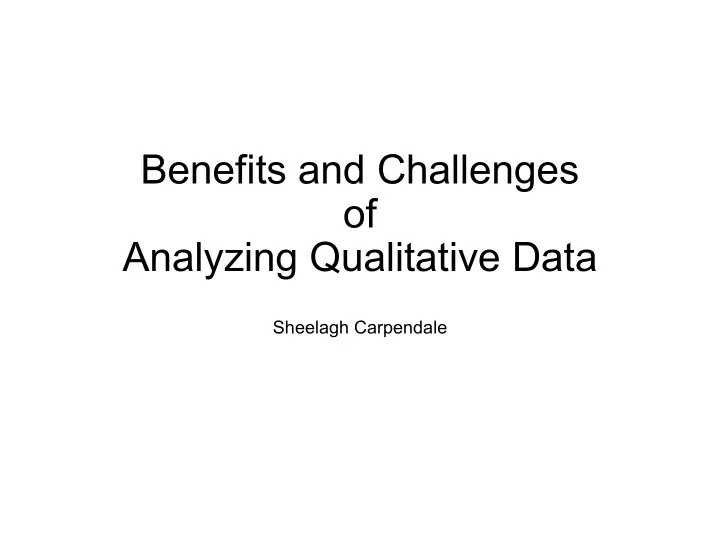

Benefits and Challenges of Analyzing Qualitative Data Sheelagh Carpendale
empirical research
binary?
qualitative or quantitative
spectrum quantitative qualitative
spectrum quantitative qualitative
we will look at the qualitative part of this spectrum qualitative
even then there are more reality‐based (on left) and more controlled (on right) reality‐based controlled qualitative
Benefits: a rich slice of reality
Benefits: a insight into real‐world tasks, and problems
Benefits: a inspiration for appropriate design
Challenges There are challenges at all stages of the process Sampling – random sampling generalization – objection ‘convenience’ sampling purposeful sampling Data gathering – ‘as is’ (fly-on-the-wall) some ‘intervention’; led; elicited, … – data lacks precision is rich and difficult to work with Data analysis – what this morning is gong to be about ….
Challenges Methods Sequential models of methods problematic – qualitative methods tend to need to be re-thought in every step – consider – ‘logic-in-use’ vs re-constructed logic’ (Kaplan) – as Maxwell (2005) suggests applying these concepts to study design – rigorous qualitative study design needs constant re-thinking
Degree of reality depends on Degree of control depends on ‐ how data is collected how data is collected ‐ ‐ how data is analyzed how data is analyzed ‐ ‐ possible to approach becomes more quantitative ‐ ‐ not possible in absolute possible to approach ‐ not possible in absolute ‐ reality‐based controlled qualitative
Degree of reality depends on Degree of control depends on ‐ how data is collected how data is collected ‐ ‐ how data is analyzed how data is analyzed ‐ ‐ possible to approach becomes more quantitative ‐ ‐ not possible in absolute possible to approach ‐ closed coding ‐ Inter‐coder reliability ‐ while my personal interest is tending towards reality‐based controlled qualitative
Degree of reality depends on Degree of control depends on ‐ how data is collected how data is collected ‐ ‐ how data is analyzed how data is analyzed ‐ ‐ possible to approach becomes more quantitative ‐ ‐ not possible in absolute possible to approach ‐ closed coding ‐ Inter‐coder reliability ‐ while my personal interest is tending towards reality‐based controlled qualitative (approximate subjective positioning)
Overview 8:30 Introductions 8:45 Benefits and Challenges of Qualitative Data Analysis (Sheelagh Carpendale) 9:00: Choosing a Focus (Uta Hinrichs) 9:15: Activity 1: choosing a focus 9:30: Closed Coding (Melanie Tory) 9:45: Open Coding (Alice Thudt) BREAK 10:10 to 10:30 10:30: Open Coding Activity Explanation (Alice Thudt) 10:35: Activity 3: open coding 11:05: Clustering and Categorizing (Soren Knudsen) 11:20: Activity 4: clustering and categorizing 11:40: Consensus and Agreement (Sheelagh Carpendale) 11:45: Closing Panel for questions and discussion 12:10 - End
Recommend
More recommend